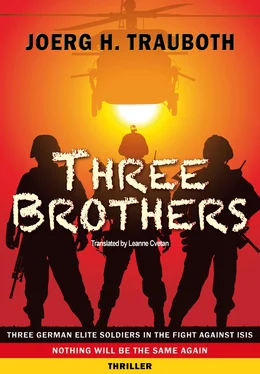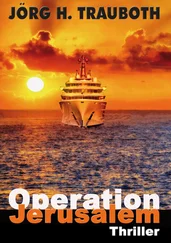1 ...7 8 9 11 12 13 ...18 Paying ransom money is a very delicate issue in the Foreign Office. Of course it happens, but no one talks about it. He only agrees to it once he knows everything he can about his opponent. You have to know your enemy before you can satisfy him.
“Please take over, Mr. Busch. I am very eager to hear what you have to say,” the chancellor assures him.
Hartmut Busch bows slightly but is otherwise indifferent.
What does he have that I don’t have? Bloedorn asks himself. The notion that the chancellor knows and, worse, likes his ear-ringed boss does not sit well with him at all. And now there is this Hartmut Busch as well!
He wonders how he can direct the chancellor’s attention to himself instead.
Hartmut starts.
“The hostages are located in Northern Iraq, in Kalak Chyah, as you can see here, northeast of Mosul, a linear distance of approximately 43 miles from the Turkish border. The area is primarily inhabited by Sunnis and was seized by jihadists. At fault for the number of refugees are not the IS fighters, who are also Sunni, but of the Shiite minister president in Baghdad. Both hostages were identified four days ago by American drones. After that, we requested the drone flights be suspended.”
He followed up his account with six aerial photos of a single building. A low-rise, flat-roof construction with two men sitting at a table outside of it.
One of the photos shows a blurry image of two people in constraints being led in front of the house.
“Are we certain that those are our hostages? I can’t make it out,” asks Henriette.
“The two figures on the building’s property have been identified by the most up-to-date methods of photo imagery analysis as our two kidnapped German citizens, Madam Chancellor. Weier is the one on the left and Fischer is on the right. We are very sure of this as one of our own men,” he looks at Brigadier General Wolf, “has been operating there since the cessation of the drone missions. He is currently back and reports that the hostages are alive and are being guarded by between two to four militants. It used to be more, but they were pulled into fighting a battle at the nearby dam. The region is completely in the hands of ISIS. The people appear to be safe.”
“Do we know anything more about the group and their ulterior motives?” she asks.
“The Federal Intelligence Service has identified the German-speaking militant without a doubt. It is a certain Wilfried Peschtl from Hanover, who has been missing for eleven months. He has taken on the role of a model terrorist.”
“What do we know about this man and his history?”
“Peschtl is a German of Egyptian heritage. He has been on our list of radical Muslims ever since he made contact with al-Qaida in Indonesia and didn’t try to keep it a secret. He lived in Cologne for many years and has disappeared with his family somewhere in the direction of Turkey. Peschtl’s ISIS name is ‘ Djehad Ardeshir ’. He sees it as his calling to murder infidels.”
Hartmut shows a number of photos of the jihadist: he is tall and blonde, with a mustache and nickel-framed glasses.
“He looks more like a professor than a terrorist,” remarks the foreign minister.
“He is intelligent and studied theology and communications in Egypt. That nice-looking face is the face of one of the most brutal foreign terrorists. He was apparently part of Bin Laden’s inner circle and participated in the terror activity in Pakistan and from there got involved with a group of fellow Muslims and was introduced to the Islamic State. He is proud of his public displays and his close ties to Caliph Ibrahim, ISIS’ political and religious leader.”
“Can we assume that ISIS is behind the kidnapping or is it a splinter group?” asks the foreign minister.
“Without a doubt, this action is coming from the very top. The threat is directed at the German government, no splinter group does that without being told to. That is the situation currently, and he can adapt himself quickly to any changes in Iraq. Above all, we should not put any faith in the idea that the Iraqi Special Forces will be able to rescue the hostages unscathed. That has already failed miserably in a different hostage situation in the past.”
“Are there political contacts to this self-proclaimed caliph?” the foreign minister asks.
“Whether or not one can even make contact with the caliph is doubtful, Minister. Nor is an attempt recommended. He is currently the most-wanted terrorist in the world. The Americans have a bounty on his head of twenty million U.S. dollars. Abdullah started out as a common criminal. He spent many years at Camp Bucca, the largest American-run detention facility in Iraq at the time. Three of his predecessors were murdered. As self-proclaimed successor to Mohammed, he is required to prove that he is making progress in the expansion of the Islamic State, as well as strictly adhering to Sharia law. He knows that the Shura Council is constantly watching him and can overthrow him at any time.”
“What is the Shura Council?” the chancellor asks.
“It is an important committee of ISIS leaders consisting of nine spiritual advisors who are educated in Islamic law. The council is supposed to guarantee that the top ISIS advisors adhere to the fundamental interpretation of Sharia law. According to the Koran, it is also theoretically at liberty to dissolve the Caliphate.”
“And practically speaking?” the chancellor follows up.
“Not very likely to happen, that would be going too far. ISIS is extremely old-fashioned in its thinking, but very modern in its leadership. Let me refer to this graphic. Caliph Abdullah has two representatives, one for Syria, and one for Iraq. Both of them are lieutenant colonels of the Iraqi army, as well as Abdullah’s fellow comrades and prison inmates. The trio makes up the leadership level, the so-called Emirate, which presides over nine councils.”
“Can each of the three make decisions alone?” the chancellor wants to know.
“As far as we know, no. The Emirate is monitored by the Shura Council and the leadership council. There are further subordinate councils as well, similar to ministries that oversee justice, security, the military, secret services, the media, finances, and the fighters.”
“You said, they are supervised by ministries? Sounds like a regular government like ours,” the chancellor equates.
The gentlemen smirk.
“Partly, Madam Chancellor. The Shura Council monitors whether the leaders adhere to the fundamental interpretation of Sharia law. So, if Caliph Abdullah were to agree to a negotiation settlement, and the council is of the opinion that both of the infidels should be beheaded, then the caliph has to side with them. And we have to assume, that this is what will happen.”
“I consider that to be a theoretical approach, Madam Chancellor,” remarks von Rüdesheim, “our allies would not support us negotiating with the world’s most-wanted terrorists for the release of two hostages.”
“Perhaps you remember the last case,” Rudi contests. “We were able to negotiate with ISIS. The hostages were freed. But then we were also not yet militarily engaged. The situation is much different today.”
Henriette notices the nodding heads around the room. Still, she always prefers to negotiate. Especially in kidnapping cases.
“In addition,” Rudi continues, “the terrorists are putting themselves in a tight spot with this multimedia production in the name of Allah. Up to now, every public threat of beheading has been followed through. As such, the decision of the terrorists is predetermined. We don’t expect the ultimatum will be extended, in other words, the hostages have no chance without any help.”
“And what does that mean?” the chancellor asks.
Читать дальше











